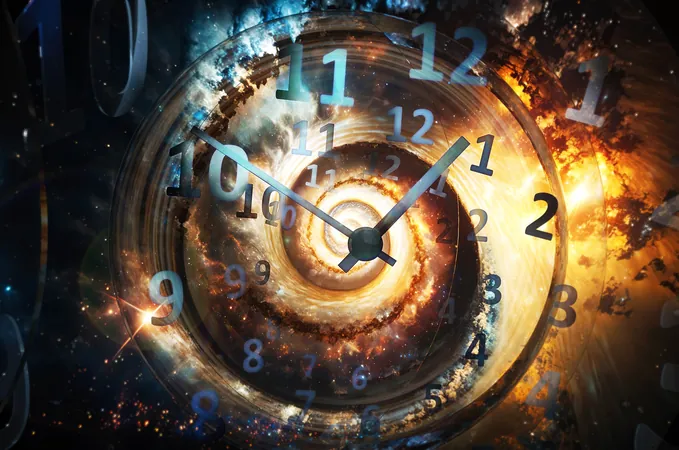
Is Time Just an Illusion? Physicists Challenge Our Fundamental Understanding of Time
2025-01-09
Author: Kai
Is Time Just an Illusion? Physicists Challenge Our Fundamental Understanding of Time
Time is something we often take for granted, with our clocks ticking away and routine schedules dictating our daily lives. It appears as a straightforward concept, but recent explorations in theoretical physics suggest that the nature of time might be vastly different from our perceptions. Some scientists posit that time, as we know it, may not actually exist in any fundamental way. They argue that our deep-rooted belief in a flowing present moment could merely be a trick of our minds.
The Paradox of Time in Daily Life
Our routines are built on the assumption that the past, present, and future are distinct and well-defined. We adhere to appointments, pay bills promptly, and rely on alarms to regulate our waking hours. However, a startling assertion made by some physicists is that 'the equations of physics do not tell us which events are currently happening.' This statement illustrates the disparity between our intuitive grasp of time and the scientific equations that seek to explain it.
Renowned theoretical physicists, such as Dr. Carlo Rovelli, have been at the forefront of researching the enigmatic nature of time. Rovelli's work in loop quantum gravity often excludes a global time parameter from the equations, raising questions about the very concept of time itself.
Einstein's Revolution: Time is Relative
The implications of Einstein's theories have profoundly reshaped our understanding of time. In his special theory of relativity, published in 1905, he introduced the idea that time is not a constant. For instance, two observers moving at different speeds or located in different gravitational fields will experience time differently—this phenomenon is known as time dilation.
His general theory of relativity, introduced in 1915, further detailed how gravity affects time, showing that the stronger the gravitational field, the more time slows down. These groundbreaking concepts reveal that time is not a constant backdrop but a dynamic and flexible component of the universe, capable of being stretched and warped under varying conditions.
Quantum Mechanics and the Question of Time
As if things weren't already complex, quantum mechanics introduces additional layers of confusion regarding time. Traditionally seen as an absolute and unchanging parameter, quantum theories suggest that no observer can definitively claim to understand a universal 'right now.' Some scientists even aim to develop theories that eliminate time altogether, such as the Wheeler-DeWitt equation, which focuses on correlations rather than temporal evolution.
The Arrow of Time: Why Does It Seem to Flow?
Despite these revelations about time, we still perceive a clear directionality in our experiences. Our universe is marked by processes where events seem to unfold from past to future. This phenomenon is closely linked to entropy—a measure of disorder in a system. The second law of thermodynamics dictates that the entropy of an isolated system tends to increase over time, suggesting that the flow of time we experience is inherently tied to this trend toward greater disorder.
The conditions of low entropy at the universe's origin set the stage for irreversible changes, allowing us to perceive time as moving from events of a 'before' to an 'after,' thus framing our reality.
Human Experience and the Illusion of Time
Some scholars speculate that as our understanding of time evolves, we may come to view it like a currency—a mental construct rather than a fundamental aspect of reality. Still, the experience of time remains pivotal in our lives. Our bodies operate on circadian rhythms, and our schedules dictate our interactions and commitments.
Ultimately, the conundrum may not lie in the question of whether time exists, but rather why our brains are so attached to the concept of time flowing unceasingly. It raises intriguing questions about consciousness and our evolution as sentient beings.
As we embark on this journey to uncover the true nature of time, one thing is certain: our understanding of the universe—and our place within it—continues to evolve. Are we ready to rethink everything we know about time? Only time will reveal the answer!


 Brasil (PT)
Brasil (PT)
 Canada (EN)
Canada (EN)
 Chile (ES)
Chile (ES)
 Česko (CS)
Česko (CS)
 대한민국 (KO)
대한민국 (KO)
 España (ES)
España (ES)
 France (FR)
France (FR)
 Hong Kong (EN)
Hong Kong (EN)
 Italia (IT)
Italia (IT)
 日本 (JA)
日本 (JA)
 Magyarország (HU)
Magyarország (HU)
 Norge (NO)
Norge (NO)
 Polska (PL)
Polska (PL)
 Schweiz (DE)
Schweiz (DE)
 Singapore (EN)
Singapore (EN)
 Sverige (SV)
Sverige (SV)
 Suomi (FI)
Suomi (FI)
 Türkiye (TR)
Türkiye (TR)
 الإمارات العربية المتحدة (AR)
الإمارات العربية المتحدة (AR)